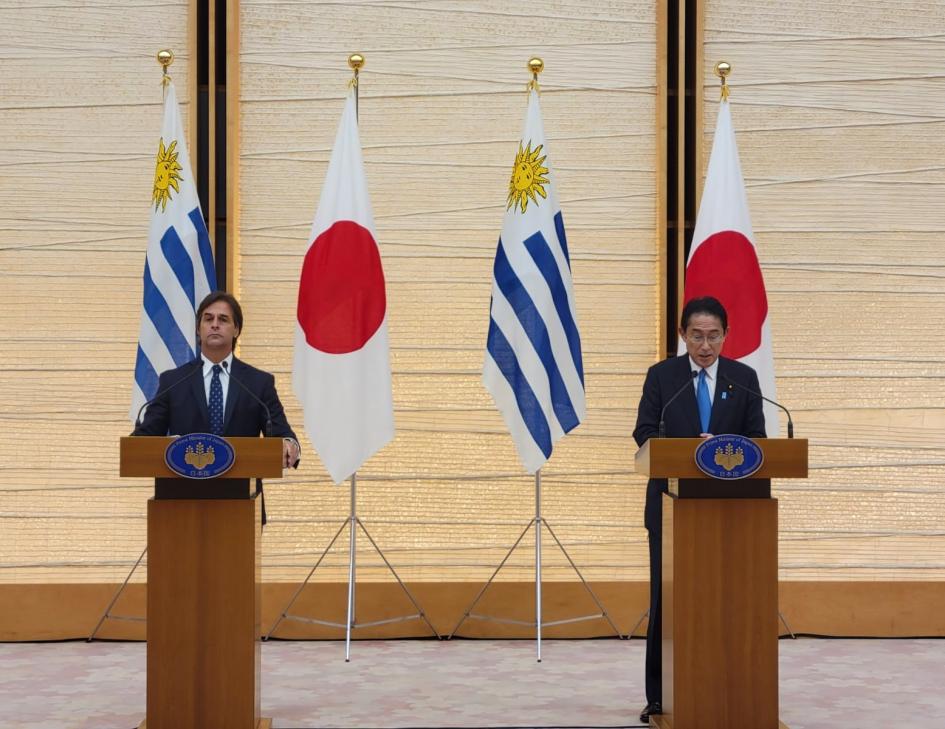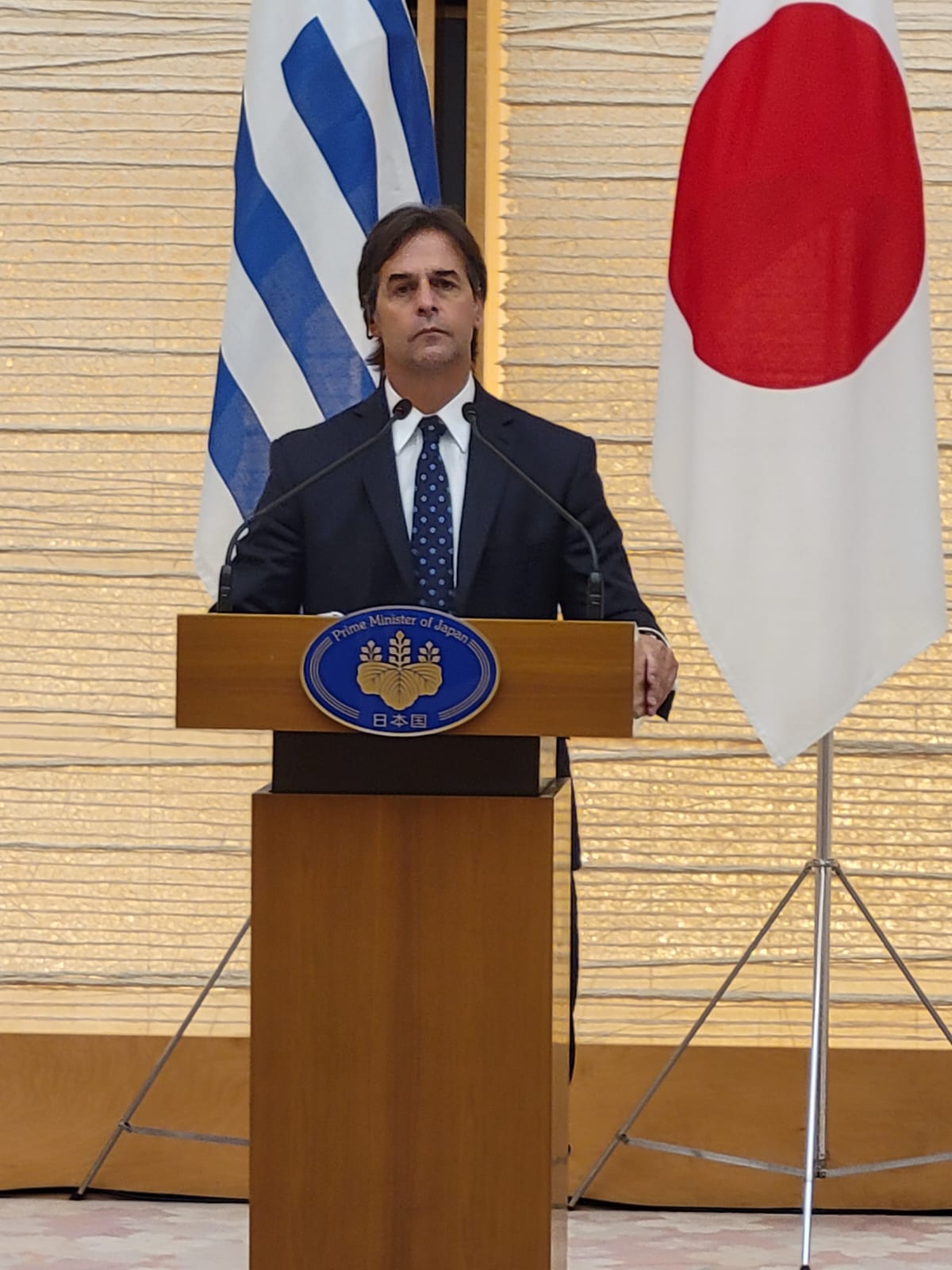Uruguay-Japan Joint Statement

On 28 October 2022, H.E. Mr. KISHIDA Fumio, Prime Minister of Japan, held a summit meeting with H.E. Mr. Luis LACALLE POU, President of the Oriental Republic of Uruguay, during his working visit to Japan.
The two leaders celebrated more than 100 years of friendship between the two countries which has been built upon the Japanese immigrants and descendants, or Nikkei to Uruguay. They also welcomed the wide range of commemorative projects undertaken on the occasion of the 100th anniversary of the establishment of diplomatic relations between Japan and Uruguay last year.
At the beginning of a new 100 years of diplomatic relations, the two leaders decided to strengthen their bilateral relations through cooperation in the following areas:
Realizing a free and open international order
1.The two leaders reaffirmed that both countries share fundamental values and principles such as freedom, democracy, and the rule of law, and are important partners in maintaining and strengthening a free and open international order based on the rule of law, and in accordance with the Purposes and Principles enshrined in the Charter of the United Nations. They reaffirmed the importance of cooperating for realizing a free and open international order based on the rule of law. Prime Minister Kishida reiterated Japan’s robust commitment towards the realization of a “Free and Open Indo-Pacific,” and President Lacalle Pou fully acknowledged Japan’s efforts in this regard.
2. Russia’s aggression against Ukraine constitutes a blatant violation of international law, in particular a grave breach of the Charter of the United Nations with ramifications well beyond Europe, including in Asia and Latin America. The two leaders reiterated the unequivocal condemnation of Russia’s aggression against Ukraine and demanded Russia’s immediate withdrawal. They strongly condemned Russia’s illegal “annexation” of Ukraine’s regions and its inhumane acts including the killing of civilians. They further condemned other Russia’s escalatory steps, including nuclear rhetoric. They affirmed their consistent support for Ukraine’s sovereignty and territorial integrity and their intention to support the Ukrainian people. Moreover, they urged all countries to condemn unequivocally Russia’s aggression and its attempt to acquire territory by force and not to recognize Russia’s illegal “annexation”. They also called for all countries not to provide Russia with any kind of military or financial assistance which would enable Russia to continue its aggression against Ukraine.
Sustainable Economic Enhancement
3. Recognizing Uruguay's potential as a business and logistical hub of South America and as a member country of Mercosur, the two leaders recognized that there is still much room for further expansion of bilateral trade and investment between Japan and Uruguay and that they will continue to work together. They welcomed the efforts on both sides to strengthen economic ties and promote exchanges among businesses, such as trade and investment promotion activities organized by JETRO and the Ministry of Foreign Affairs of Uruguay, in commemoration of the 100 years of diplomatic relations.
4. The two leaders welcomed the progress made regarding the bilateral legal framework for the enhancement of economic relations: the Tax Convention and the Customs Mutual Assistance Agreement.
5. The two leaders acknowledged the complementarity between the economies of Uruguay and Japan. Recognizing the importance of bilateral trade of industrial and agricultural goods, they decided to continue exploring various strategies to invigorate and strengthen such trade. In this regard, they welcomed the steady progress made on pending sanitary issues and hoped for announcements to be taken place upon their successful completion in the near future.
6. The two leaders shared the view on the importance of creating a “virtuous cycle of the economy and the environment”. Aiming to realize Net Zero by 2050, they decided to promote innovation on clean energy and decarbonization technologies.
7. Recognizing the progress made by Uruguay on renewable energy, which accounts for about 96% of the electricity supply, the two leaders welcomed the strengthening of cooperation among relevant agencies in this area, including technical cooperation on the promotion of hydrogen energy. They also highlighted the signing of the Memorandum of Understanding (MoU) to enhance mutual cooperation on hydrogen energy and other green technologies in Uruguay between Japan Bank for International Cooperation (JBIC) and the Ministry of Economy and Finance of Uruguay.
8. President Luis Lacalle Pou highlighted Uruguay’s commitment to maintain ambitious climate and biodiversity standards. In that sense, he referred to the launch of the Sovereign Sustainability-Linked Bond (SSLB) Framework by Uruguay, which links debt funding with environmental objectives.
9. The two leaders welcomed the successful issuance of Samurai Bonds by the Government of Uruguay for the first time in the last 10 years, with JBIC purchasing part of them, and shared the expectation that business of both countries will be further stimulated in the area of decarbonization such as green hydrogen.
10. The two leaders stressed that information and communication technologies present new opportunities and challenges and, at the same time, there is a need to provide enhanced collaboration in preventing technology from being misused or abused for malicious activities, with an aim to enhance promotion and protection of critical technology.
11. The two leaders shared the view on the importance of promoting digital transformation (DX). Recognizing that an open, secure, stable, accessible and peaceful ICT environment, in particular 5G network, is essential for all and requires effective cooperation among States to reduce risks to international peace and security, they affirmed their commitment to fostering such ICT environment based on mutual trust and confidence, guided by democratic values and respect for human rights.
12. The two leaders affirmed the importance of telecommunication supplier diversity and advancing the deployment of secure, open, and transparent telecommunication networks and expressed that both countries will work to this end in areas such as the advancement of secure 5G networks and open and interoperable technologies, including Open Radio Access Networks (Open RAN).
13. The two leaders welcomed the decision to launch the Japan-Uruguay Joint Committee, which will bring together the relevant ministries and agencies to boost cooperation across sectors for sustainable and resilient economic enhancement, including economic security, and to hold the first meeting as early as possible.
14. On behalf of the people and government of Uruguay, President Lacalle Pou expressed his gratitude for the economic cooperation provided by the Japanese government. Prime Minister Kishida expressed Japan's intention to continue its support through various measures to the efforts of Uruguay, as a country in transition in order to contribute to achieving Sustainable Development Goals of 2030 agenda.
15. Prime Minister Kishida welcomed Uruguay’s participation in the Expo 2025 Osaka, Kansai, which will promote the future vision of human society, looking for solutions to common challenges such as human health, food, agriculture, environment, climate change, energy, gender inequality and natural disaster prevention. The Expo will also provide an excellent opportunity to showcase Uruguay to the world.

Revitalizing People-to-People Exchange
16. The two leaders reaffirmed the importance of continuing bilateral meetings, including high level talks, which promote further mutual understanding between the two countries and enhance political cooperation and policy coordination.
17. The two leaders welcomed the exchange of the Notes on the working holiday program during the visit of President Lacalle Pou and expressed their hope that it would promote exchanges and mutual understanding between the youth of the two countries and further strengthen the friendly and cordial relations between the two countries.
18. The two leaders shared the view that people-to-people exchange remains to be important while recognizing the convenience of online tools amidst the COVID-19 pandemic, and decided to promote people-to-people exchanges between the two countries in a wide range of fields such as sports exchanges, cultural and educational exchanges including inter-university exchanges, Japanese Government Scholarship, and Japanese language education.
Cooperation in the International Fora
19. The two leaders affirmed that both countries are shifting the focus from the response to the global health crisis caused by the COVID-19 pandemic to normalizing society and revitalizing the economy, and recognized the need to strengthen cooperation looking ahead to the post-COVID-19 era.
20. The two leaders shared the view that international cooperation is indispensable in containing COVID-19. President Lacalle Pou appreciated Japan’s assistance in the "Project to Renovate Health Care Centers in Four Prefectures and Improve Medical Equipment". They expressed their intention to continue to cooperate in the fight against COVID-19.
21. The two leaders affirmed to strengthen cooperation in a wide range of international fora, including the UN and the World Trade Organization (WTO).
22. The two leaders reaffirmed their support to the Charter of the United Nations and multilateralism based on the rule of law. They underscored their determination to work together with a view to strengthening the United Nations as a whole, including early reform of the Security Council. Prime Minister Kishida expressed his gratitude to Uruguay for its support for Japan’s permanent membership in a reformed Security Council.
23. The two leaders reaffirmed also their support to the peacekeeping efforts of the UN as expressed in Action for Peacekeeping and Action for Peacekeeping plus. They discussed the possibilities of cooperation in the area of peacekeeping operations and shared their will to explore these opportunities.
24. The two leaders affirmed the importance of addressing climate change, a common challenge of humankind, and decided to work together towards net zero by 2050 and the decarbonization of the world.
25. The two leaders confirmed the importance of development finance adhering to international rules and standards, such as debt sustainability and transparency.
26. The two leaders affirmed the important role of an open, free, fair, equitable, sustainable, non-discriminatory and inclusive rules-based multilateral trading system, with the WTO at its core, and acknowledged the need to work on WTO reform in order to ensure its proper functioning including a fully and well-functioning dispute settlement system. They also shared concerns with economic coercion, which undermines free and fair trade in the multilateral trading system and the rules-based international economic order.
27. The two leaders reaffirmed the critical importance of respecting international law, in particular the UN Convention on the Law of the Sea (UNCLOS) with its provisions on the obligation to settle disputes by peaceful means, and maintaining freedom of navigation and overflight. They strongly opposed any unilateral attempts to change the status quo by force or coercion that increases tensions. In this regard, Prime Minister Kishida expressed serious concerns about the situation in the East China Sea and the South China Sea.
28. The two leaders condemned North Korea’s ongoing development of nuclear weapons and ballistic missiles, reiterating their commitment to achieving the complete, verifiable and irreversible dismantlement of all weapons of mass destruction, ballistic missiles of all ranges and related programs. They urged North Korea to comply with its obligations under the relevant UN Security Council resolutions (UNSCRs) and emphasized the importance of the international community to fully implement the UNSCRs. They expressed serious concerns on the human rights situation in North Korea. They also urged North Korea to resolve the Japanese abductions issue immediately.
29. The two leaders reaffirmed that the two countries will work closely with each other to maintain and strengthen the regime of the Treaty on the Non-Proliferation of Nuclear Weapons (NPT) as the cornerstone of the international nuclear disarmament and non-proliferation regime and to continue pursuing effective nuclear disarmament measures such as the early entry into force of the Comprehensive Nuclear-Test-Ban Treaty (CTBT). They stressed that the 40-year long decline in global nuclear arsenals must be sustained and not reversed. In this regard, they called for the prompt commencement of negotiations on a Fissile Material Cut-off Treaty (FMCT).
Dirección de Prensa
Ministerio de Relaciones Exteriores
